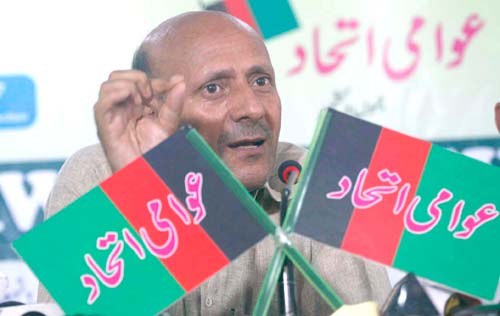With a new political party launched, the vote-equation in already divided political landscape of Kashmir got jittered. Shah Abbas, talks to political analysts to understand the impact of new players on the fragile power balance maintained by biggies of Kashmir politics.
Regardless of how history remembers him, there are a few very important dates in the career of independent lawmaker Engineer Rashid. The date he resigned from government service, the date he was declared elected for the state legislative assembly and finally June 12, 2013 when he announced creation of his party – Awami Ittehad. He must have clear vision what he intends to do and which targets he is keen to hit with his ‘people’s unity’ but he has reincarnated himself as another politician who will eventually contribute in dividing and sub-dividing a society – a phenomenon that exists on either side of Kashmir’s politics’ ideological divide.
Division has always played a key role in fracturing the mandate of a society and helped those who stay consolidated on area of importance. It is this trend that led to the famous saying: ‘divide and rule’. Kashmir has finally become the latest laboratory to test the dictum. These divisions will have huge impact on upcoming assembly polls in Kashmir.
Prof Gul Mohammad Wani, who teaches political Science at University level, believes Kashmir is facing fragmentation as compared to Jammu and Ladakh even though these two regions also have their issues. “The pace of fragmentation is not in Jammu and Ladakh as it is in Kashmir though Jammuites and Ladakhis have their own very serious issues,” Gul said.
MLA Langate, Er Rashid too launched his party last week. How many seats his party can bag in the coming elections is anybody’s guess but he will surely disturb the vote ratio in north Kashmir’s Kupwara and Baramulla districts.
In the recent past, Ghulam Hassan Mir and Hakim Yasin also formed their own parties. Both are the members of legislative assembly and enjoy a considerable support in the selective pockets of north and central Kashmir. Gone are the days when valleyiates had to choose between National Conference (NC), Peoples Democratic Party (PDP), and Congress only.
Now there is Sajad Gani Lone, separatist turned unionist who heads his own faction of People’s Conference. Sajad Lone, who is confined to certain areas of north Kashmir only, has started to focus on central Kashmir including the Srinagar city.
Lone too is sure to play a vital role in dividing the votes. He is sharing the brand of ‘People’s Conference’ with his separatist brother, Bilal Gani Lone, who is an executive member of Hurriyat (M) and differentiates between the unionists and separatists on the basis of elections only.
According to Dr Sheikh Showkat, a political analyst and legal expert, all these small parties and politicians are in the foray only “to harvest their personal interests” and to him “they are not even being counted anywhere so they are not going to affect the local politics in a big way.”
Prof Gul also has the same opinion that these small parties which are known only by one individual can’t make a big difference. “The individual players can’t have much of the impact on the coming elections.”
“To divide Kashmiris has been a very old aim of the policy makers in New Delhi, this aim of theirs was prioritized from last two decades and the time has now come when they can celebrate their success,” a known legal expert, affiliated with the High Court Bar Association wishing anonymity told Kashmir Life. He added, “May it be the division among separatists or unionists, the Kashmiri voice is getting divided.”
But Prof Wani does not believe much on conspiracy theories. “In conflicts, conspiracy theories are circulated, hidden and invisible hands always remain active in conflicts but the question is why we should get divided.”
In the regions where democratic deficit is high, factionalism also remains at a very high level. “You can even observe it in many parts of India which do not fall in the conflict areas,” Wani opines.
NC, PDP and Congress, the leading unionist political parties in Jammu Kashmir make tall claims of forming the next government in the state at their own; however, the ground reality tells an entirely different story. In fact the emergence of new small political parties, have created a political confusion which was never seen before, particularly in Kashmir valley. The situation suggests that the principal unionist political parties themselves are not certain about their future and are trying to search for pre or post poll allies.
















